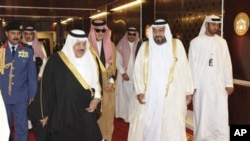DUBAI - The future of seven Islamist activists stripped of their nationalities and imprisoned in the United Arab Emirates remains in doubt after a court this week rejected a request to return the men’s Emirati passports. It is the latest incident in what appears to be an intensifying crackdown on dissent by authorities in the Gulf nation worried that regional unrest could spread to their shores.
The seven men, who are all members of the Reform and Social Guidance Association (al-Islah), had their citizenship revoked in December over alleged terror links, and they were arrested in April after refusing to obtain new nationalities.
Their lawyer, Mohammad al-Roken, says he was prohibited from meeting with the men before the court announced Thursday it was dismissing their appeal for reinstatement of their citizenship.
"We are going to appeal against this decision. In the meantime, we have filed a new case challenging the presidential decree that was passed last December on the grounds that this decree is unconstitutional," said al-Roken.
According to the government, the men - commonly referred to as the UAE 7 - pose a threat to state security, but Samer Muscati from Human Rights Watch says there is insufficient evidence to support the claim.
"If you look at the records of these men, they’re not specifically identified with any criminal activity," said Muscati. "The only reason they appear to be rounded up is because of their membership in al-Islah."
Rights groups say 15 political activists are currently under arrest in the UAE. Almost all of them are al-Islah members who signed a petition last year calling for a more representative government in the country.
Al-Islah adheres to the same Islamic principals as the Egypt-based Muslim Brotherhood, but is not officially linked to the group.
The UAE and its Gulf Arab neighbors perceive the Muslim Brotherhood as being anti-monarchy and a threat to the ruling families of the region.
The ongoing oppression of al-Islah has caused divisions among Emiratis.
However, Christopher Davidson, a lecturer in Middle East politics at Durham University, says citizens who object to what is happening will likely remain quiet because of the generous welfare provided by the government.
"Crucially, we’re not seeing vast swaths of the population supporting these gentlemen and that’s to be expected given that most people are financially appeased," said Davidson. "So we’re not going to see much sympathy for these individuals apart from a few quiet murmurings or anonymous posts on social media."
The UAE’s crackdown on perceived opposition figures grabbed international headlines last year when five activists were convicted of anti-state crimes. They were later pardoned by the president, but one of the men, who is stateless, was rearrested last month and faces deportation.
Rori Donaghy, from the Emirates Centre for Human Rights, says the UAE’s hardline approach is likely to backfire if it carries on.
"The UAE should stop locking up people who are calling for democracy and start talking to them because that’s the only way the national unity will be preserved and the stability of the UAE seen into the future," said Donaghy.
The UAE is an American ally made up of seven sheikhdoms, with Abu Dhabi as its capital.
The seven men, who are all members of the Reform and Social Guidance Association (al-Islah), had their citizenship revoked in December over alleged terror links, and they were arrested in April after refusing to obtain new nationalities.
Their lawyer, Mohammad al-Roken, says he was prohibited from meeting with the men before the court announced Thursday it was dismissing their appeal for reinstatement of their citizenship.
"We are going to appeal against this decision. In the meantime, we have filed a new case challenging the presidential decree that was passed last December on the grounds that this decree is unconstitutional," said al-Roken.
According to the government, the men - commonly referred to as the UAE 7 - pose a threat to state security, but Samer Muscati from Human Rights Watch says there is insufficient evidence to support the claim.
"If you look at the records of these men, they’re not specifically identified with any criminal activity," said Muscati. "The only reason they appear to be rounded up is because of their membership in al-Islah."
Rights groups say 15 political activists are currently under arrest in the UAE. Almost all of them are al-Islah members who signed a petition last year calling for a more representative government in the country.
Al-Islah adheres to the same Islamic principals as the Egypt-based Muslim Brotherhood, but is not officially linked to the group.
The UAE and its Gulf Arab neighbors perceive the Muslim Brotherhood as being anti-monarchy and a threat to the ruling families of the region.
The ongoing oppression of al-Islah has caused divisions among Emiratis.
However, Christopher Davidson, a lecturer in Middle East politics at Durham University, says citizens who object to what is happening will likely remain quiet because of the generous welfare provided by the government.
"Crucially, we’re not seeing vast swaths of the population supporting these gentlemen and that’s to be expected given that most people are financially appeased," said Davidson. "So we’re not going to see much sympathy for these individuals apart from a few quiet murmurings or anonymous posts on social media."
The UAE’s crackdown on perceived opposition figures grabbed international headlines last year when five activists were convicted of anti-state crimes. They were later pardoned by the president, but one of the men, who is stateless, was rearrested last month and faces deportation.
Rori Donaghy, from the Emirates Centre for Human Rights, says the UAE’s hardline approach is likely to backfire if it carries on.
"The UAE should stop locking up people who are calling for democracy and start talking to them because that’s the only way the national unity will be preserved and the stability of the UAE seen into the future," said Donaghy.
The UAE is an American ally made up of seven sheikhdoms, with Abu Dhabi as its capital.




